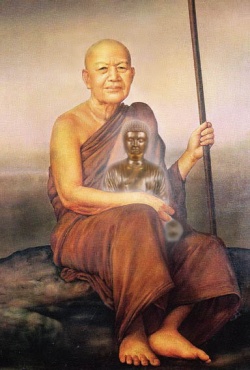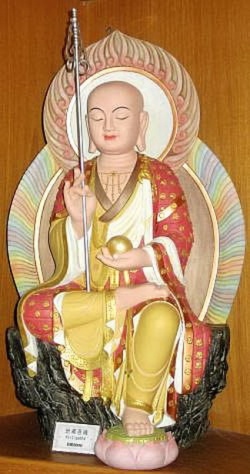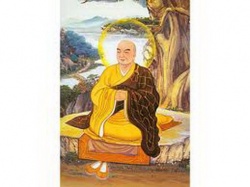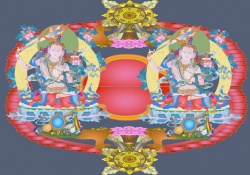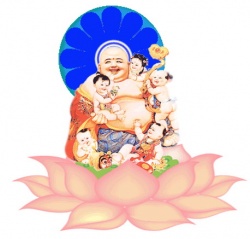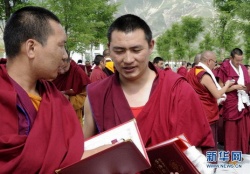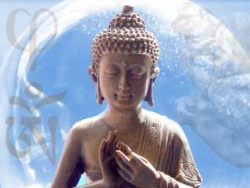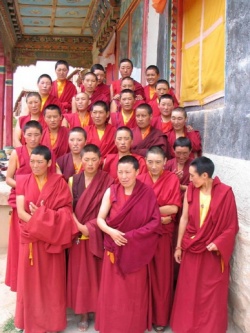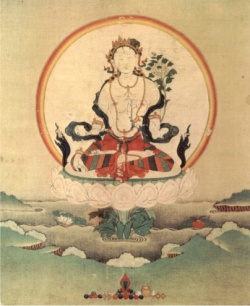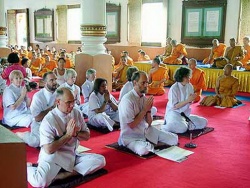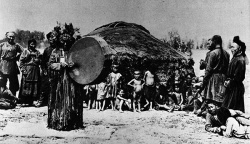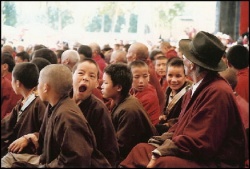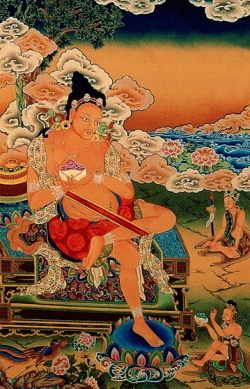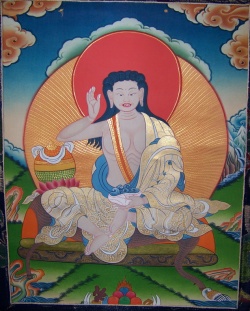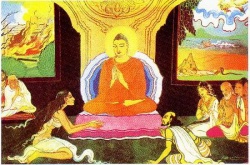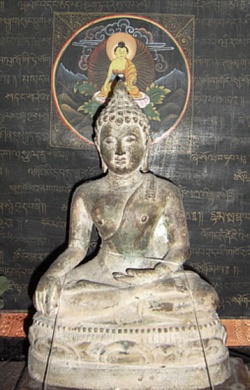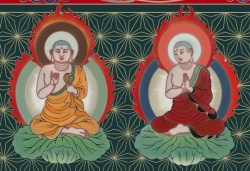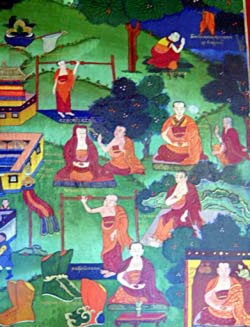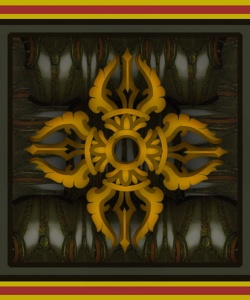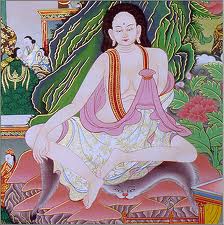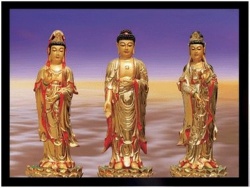D.T. Suzuki, Zen and the Nazis
Brian Daizen Victoria
Part One
Introduction
The always contentious, sometimes highly emotional, debate over D.T. Suzuki’s relationship to Japanese fascism continues unabated. Among other things this is shown by reader reactions to a recent article in Japan Focus entitled “Zen as a Cult of Death in the Wartime Writings of D.T. Suzuki". This debate can only intensify by the further assertion of a wartime relationship between D.T. Suzuki and the Nazis or, more precisely, a positive or sympathetic relationship between Suzuki and the Nazis. This article, in two parts, will explore that possibility though conclusive proof of such a relationship will not be included until the second part.
Satō Gemmyō Taira, a Buddhist priest in the Shin (True Pure Land) sect, who identifies himself as a disciple of Suzuki in the postwar years, adamantly rejects the possibility of a positive relationship between Suzuki and the Nazis. On the contrary, he insists that at least as far back as the fall of 1936 Suzuki clearly and publicly expressed his opposition to both Hitler and Nazi policies. Satō writes:
Although Suzuki recognized that the Nazis had, in 1936, brought stability to Germany and although he was impressed by their youth activities (though not by the militaristic tone of these activities), he clearly had little regard for the Nazi leader, disapproved of their violent attitudes, and opposed the policies espoused by the party. His distaste for totalitarianism of any kind is unmistakable1
In truth, I myself had long wondered about the possibility of some kind of relationship between Suzuki and the Nazis. After all, for much of the Asia-Pacific War the two countries were allied militarily. At the time I published the first edition of Zen at War in 1997, I was puzzled and intrigued by the following cryptic comment in The Essence of Bushidō (Bushidō no Shinzui), a book strongly backed by the Japanese military and published in November 1941, i.e., only one month before Pearl Harbor. Suzuki’s contribution consisted of a chapter entitled “Zen and Bushidō” (Zen to Bushidō). In his introduction, Suzuki’s editor, Handa Shin, wrote: “Dr. Suzuki’s writings are said to have strongly influenced the military spirit of Nazi Germany.”2
On the one hand it can be said that any Nazi use of Suzuki’s writings, if such existed, would be a separate issue from Suzuki’s personal attitude toward the Nazis. Nevertheless, I couldn’t help but wonder if Handa’s assertion were true, especially as he offered no proof for his claim. Yet, where could one turn to prove or disprove Handa’s claim? Were the Nazi’s even aware of Suzuki’s writings, let alone influenced by them?
As I pondered these questions, I recalled a relevant passage in Kenneth Kraft’s book, Zen Teaching, Zen Practice. Kraft points out that the first American to make direct contact with D.T. Suzuki in postwar, occupied Japan was Albert Stunkard. Stunkard described his encounter as follows:
I was working in Tokyo as an army medical officer at Sugamo Prison, providing medical care for the men who were being tried for war crimes by the International Military Tribunal for the Far East. . . . One of the prisoners, later to become recognized as a religious thinker, was [Karlfried] Graf Dürckheim, a German. He used to talk to me about Zen. One day he mentioned Dr. Suzuki, with whom he had studied, suggesting that I visit Dr. Suzuki at his home in a small town not far from Tokyo.
I took up the suggestion and not long afterwards met Dr. Suzuki in his house on the grounds of Engakuji monastery in Kita Kamakura. . . . Dr. Suzuki welcomed me, took the letter of introduction from Graf Dürckheim, and led me inside his house, where he adjusted his spectacles and read the letter. He was slender and a bit frail, with a face dominated by huge eyebrows that curved upwards and outwards. When he had finished the letter, Dr. Suzuki asked me about Dürckheim and the other prisoners at Sugamo.”3 (Italics mine)
While I hadn’t paid much attention to this passage when I first read it, now it brought a flood of questions to mind, first and foremost who was Graf [Count] Dürckheim (1896-1988)? And why was Dürckheim imprisoned as a suspected war criminal? Further, why had a suspected German war criminal been studying with D.T. Suzuki during the war years?
More important, why had Suzuki accepted a suspected German war criminal, almost certainly a Nazi, as his student if, as Satō claims, Suzuki “clearly had little regard for the Nazi leader, disapproved of their violent attitudes, and opposed the policies espoused by the party.” Something didn’t add up. And as if all of these questions were not enough, I was particularly struck by the following comments posted on Wikipedia’s entry for Dürckheim:
Stunkard later became Suzuki's physician. That visit started a chain reaction of visitors to the Suzuki residence, one of whom was Philip Kapleau, author of The Three Pillars of Zen and founder of the Rochester Zen Center. Dürckheim thus was directly responsible for launching Zen into the American mainstream.4 (Italics mine)
Is it possible, I remember thinking, that a Nazi, imprisoned as a suspected war criminal, was “directly responsible for launching Zen into the American mainstream”? Perhaps this was just another of Wikipedia’s many inaccuracies or at least a rhetorical overstatement. Or was it? These were just a few of the questions that drove me to examine the record more carefully.
Suzuki’s Newspaper Articles in October 1936
In pondering where to begin my quest for more detailed information, it appeared that a chronological approach made the most sense, especially as it might reveal any changes in Suzuki’s thinking that occurred along the way. Thus, a close examination of his fall 1936 series of newspaper articles, describing a visit to Germany, seemed a good place to begin inasmuch as this series contained what appear to be Suzuki’s first public comments on the Nazis. Suzuki’s views of the Nazis appeared in the Japanese Buddhist newspaper, Chūgai Nippō, on 10, 11, 13 October 1936.
Although the Nazis had set up large and brutal concentration camps like Dachau for political prisoners as early as 1933, the policy aimed specifically at Jews, known as the “final solution” i.e., their extermination, had yet to be implemented. Nevertheless, various forms of Jewish persecution, as Suzuki himself notes, were already underway, most especially with the passing of the so-called Nuremberg Laws in September 1935. These laws included a ban on sexual intercourse between people defined as Jews and non-Jewish Germans and had the overall effect of preventing Jews from participating in German civic life, even visiting public parks or beaches.
While Suzuki defenders claim Suzuki could not have known in 1936 of the subsequent horrors of Hitler and the Nazis, it is noteworthy that there was at least one Buddhist organization in Japan that understood as early as 1933 just how dangerous and anti-Buddhist the Nazi movement was and strongly condemned it. This group was the "Youth League for Revitalizing Buddhism" (Shinkō Bukkyō Seinen Dōmei).
In May 1933 the All Japan Federation of Buddhist Youth Organizations (Zen Nippon Bukkyō Seinen-kai Renmei) held its third national conference. The federation was composed of more than four hundred and fifty separate Buddhist groups, one of which was the Youth League. League representatives proposed, among other things, that the Federation go on record opposing "anti-foreign, militarist and nationalist ideologies," including movements that promoted the same.
As one expression of such an ideology, Youth League representatives put forward a motion condemning the Nazi Party and its leader Adolph Hitler:
Hitler is a person who is thoroughly suppressing the Jewish people by force and casually burning cultural treasures without a second thought. Furthermore, Hitler crushes without exception all liberals and advocates of peace who are incompatible with the Nazi spirit. Outrages of these kinds are both inhumane and anti-Buddhist, and we must resolutely protest them.5
The response of the conference host, Ōtani University, to this and similar League proposals was, in an unprecedented move, to force the entire conference off-campus to find a new meeting site. Not only that, the All Japan Federation expelled the Youth League from its midst. Given that Hitler had only been appointed Chancellor of Germany in January 1933 it can be said that the League’s representatives were very insightful in their understanding of the Nazis and what their existence portended for Europe, let alone Japan. While there is no proof that Suzuki knew of the events surrounding the Youth League, he was a professor of Buddhism at Ōtani University, and it is difficult to believe that he was unaware of the Youth League’s opposition to the Nazis or the price they paid for it.
Be that as it may, Suzuki went to England in 1936 where he delivered a set of lectures that he would publish as his famous Zen Buddhism and Its Influence on Japanese Culture in 1938 (republished in the postwar era as Zen and Japanese Culture). Following the conclusion of his lecture tour in England, he went to Paris to conduct bibliographical research, and then on to visit some distant relatives living at the time in Rüdesheim am Rhein, a small village on the Rhine River west of Wiesbaden.
In connection with his visit to Rüdesheim, Suzuki published a series of articles in the Buddhist newspaper Chūgai Nippō under the title “From a Spot on the Banks of the Rhine” (Rain kahan no ichigū kara). The initial sections of his article consisted of a fairly ordinary travelogue in which Suzuki described such things as visits to local churches and reflections on the cultural implications of the stone-based architecture of Germany versus the wood-based architecture of Japan. He then went on to describe the political events he observed while in Germany, including the following description of the Nazis and his thoughts about them.
I would like to express my appreciation to the late Kyoko Selden, Senior Lecturer in Japanese at Cornell University, and James Mark Shields, Associate Professor at Bucknell University, for their helpful suggestions and advice throughout the translation process. That said, the final responsibility for the accuracy of the translation, not to mention the accompanying commentary, is mine alone.
Translation
My relative has been living in this city [i.e., Rüdesheim am Rhein] for a long time and has many acquaintances. When he meets his acquaintances they exchange greetings by giving the Nazi salute and saying, “Heil Hitler!” When I asked my relative the reason for his celebration of Hitler, what he told me is briefly as follows:
Before Hitler arrived on the scene there were many political parties in Germany. As a consequence, political affairs were unable to find a direction and citizens became more and more depressed as time went on. They were at their wit’s end, wondering what was to become of them. Hitler, however, was able to unite the people and lead us with a definite goal in mind. Thus we have never experienced a greater sense of relief than we have today. While we don’t know much about politics, we have never enjoyed greater peace of mind than we have now. Isn’t that reason enough to praise Hitler?
This is what my relative told me, and I agree this is quite reasonable.
Changing the topic to Hitler’s expulsion of the Jews, it appears there are considerable grounds for this, too. While it is a very cruel policy, when looked at from the point of view of the current and future happiness of the entire German people, it may be that, for a time, some sort of extreme action is necessary in order to preserve the nation. From the point of view of the German people, the situation facing their country is that critical.
On occasion, in England, too, I have encountered Jews. I recently met a young self-professed wealthy poet who had been persecuted and expelled from Germany. After listening to his story, I felt sorry for him because he suddenly found himself living in poverty in a foreign land. As regards individuals, this is truly a regrettable situation.
Recently the Nazis held a major rally in Nuremburg. At that time Hitler announced what may be considered to be the principles underlying the expulsion of the Jews. These principles are as follows:
The Jews are a parasitic people who are not indigenous, i.e., who develop no connection to the land. They are neither farmers nor industrial workers. Instead, they are merchants situated between producers and consumers. As such they are the class that extracts profits from both groups. In this respect, i.e., in intellectual terms, it can be said that they are far more developed than the indigenous German people. After the Great War [WW I] they rushed like a flood into Germany. Taking advantage of the German people’s exhaustion, they monopolized profits in the commercial sector while utilizing their power in the political arena solely to advance their own interests. As a result, the German people became increasingly fearful with the result that someone like Hitler appeared on the scene. That is to say, the expulsion of the Jews is an action taken in self-defense. It is the resistance of indigenous people to immigrants from outside.
The fact that they have no country is karmic retribution (J. gōhō) on the Jews. Because they have no attachment to the land and are wanderers, it is their fate to intrude into state structures created by others. As a result they are primarily involved in intellectual activities, an area in which they have shown great ability. Intellectual activities broadly interpreted means that they are members of the ruling class. In the case of today’s German people they find it extremely difficult to accept their country being disturbed by a foreign race.
This appears to be the feelings and assertion of Hitler and others.
It is for this reason that the Nazis fiercely attack Soviet Russia. They claim that the core of the Communist Party, beginning with Stalin himself, is composed of either Jews themselves or their relatives who have some connection to them and that, since people like these are up to no good, one of the great missions of the German people is to crush Soviet Russia. The speeches given by the leaders at the recent Nazi rally in Nuremburg, among others, were very extreme. They directly attacked the Soviet Union as their great enemy of the moment. They said as much as could be said in words, completely ignoring diplomatic niceties and attacking them viciously. From looking at the newspapers, you can get a good sense of their truly fierce determination. People are saying that if, in the past, the leaders of one country had done something like this it is inevitable that within twenty-four hours the other country would have declared war. In any event, the Nazis’ determination is deadly serious!
The Nazis have focused their attention on youth movements, including engagement in volunteer labor and marching with spades on their shoulders with the goal of communing with nature. I believe this is something that is truly fine no matter in what country it takes place. I will, however, not immediately judge the rights and wrongs of a situation in which totalitarianism (J. zentaishugi) is overly emphasized and everyone has to wear military uniforms. That said, placing a spade on one’s shoulder and harvesting the bounty of the earth without payment as a form of mutual assistance is something I would most definitely like to have Japanese youth do.
Setting aside the question of Communism’s ideology, the people at its core are intellectuals who have never been intimately connected with the land. Furthermore, their ideology is something that has been directly imported from abroad and has no roots in the history of that country. Taking their claims to be absolute, they butcher those who oppose them without hesitation. This is something that others and I can in no way approve. While it is true that Nazis and Fascists also insist on totalitarianism, in one sense it can be said that theirs is a form of resistance to Communist actions. Or it can also be understood as turning the Communists’ methods to their own advantage.
About an hour and a half boat ride south from the city of Rüdesheim is an old city on the other shore known as Bacharach. On the mountain behind this city is an old castle called Stahleck Castle. This has been restored in recent years as a lodging for male and female youth groups. The outside of the castle has been maintained as it was with stones piled one on top of another in what is clearly a solid structure. The interior, though plain, has been modernized and made into a well-appointed facility.
During the summer, youth groups are accommodated here where they lead a disciplined life and visit nearby historical sites. Nazi lecturers are invited to speak on such things as Nazi views and institutions as well as engage in discussions. The room where medieval knights once met is now used as a lecture hall, and in it is a bust of Hitler. The youth in the hall explained that this is the only bust that Hitler had made for youth groups. Although only half of the castle tower remains, I was informed there are plans to completely restore it in the near future. If I had more historical and architectural knowledge of old castles I would be able to share more interesting impressions but, unfortunately, I am unlearned in these matters so I cannot do any better than this.
In any event, in Japan there should be a better understanding of the purpose of the lifestyle followed in a Zen temple. I would like to have youth experience this. Further, inasmuch as youth in the True Pure Land sect [of Buddhism) and others have aspects that appear to be overly aristocratic I would like to see them, too, practice the lifestyle of Zen training monks (J. unsui), communing with the earth and developing the habit of unstintingly devoting themselves to labor. This is, of course, what the German youth movement is doing, but we have had a method of character building in Japan from ancient times.
At this point Suzuki ends his discussion of the Nazis and concludes his article with some final comments on differences he noted between Buddhism and Christianity based on what he had seen in Germany.
Comments
The first thing to be noted about the above is that it is one of two competing translations of the same material. Satō Kemmyō Taira, in collaboration with Thomas Kirchner, made a second translation that is available here: [Satō, Kemmyō Taira. “Brian Victoria and the Question of Scholarship.” The Eastern Buddhist 41/2, pp. 147-150].
Some readers may want to read Satō’s translation first before reading the following comments, although that is not necessary. What is remarkable about these two translations is how starkly they differ in their portrayal of Suzuki’s comments on the Nazis. Given Satō’s earlier comments it will not surprise the reader to learn that his translation serves not only to exonerate Suzuki from any possible Nazi sympathies, but also portrays him as a critic and a brave opponent of Nazi policies, especially their oppressive treatment of Jews.
By comparison, the translation that I provide here, presents Suzuki’s views in a more nuanced manner, suggesting at least some degree of sympathy or at least understanding of the Nazis and their policies. Readers familiar with Japanese are invited to read the article in the original as attached in Appendix II.
At any rate, these two translations, one that completely exonerates Suzuki and the other that implicates him, vividly demonstrate the crucial role played by the translator who, at least to some degree, ends up being an “interpreter” of the text’s meaning, especially in light of the often ambiguous nature of the Japanese original. It is also a vivid reminder of just how dependent the reader is on the competence of translators, including their political and religious affiliations as well as their personal agendas. In short, in the world of translations is definitely a case of reader beware!
Preliminary Background Remarks
So how then does one go about deciding which of two significantly different translations is correct? The traditional way, of course, is to undertake a lexical analysis, i.e., a careful word-by-word, phrase-by-phrase comparison of the original text with each of the translations. That is to say, to question which translation more accurately conveys the meaning of the original?
Those inclined to traditional textual exegesis are invited to read Appendix I of this article. There readers will find an introduction to the key differences between the two translations together with an analysis of the Japanese terms leading to these differences. The major difficulty with this approach, however, is that, at least for the non-specialist reader, these discussions can easily be viewed as semantic quibbling. Is there no better method than this?
The author’s view is that when faced with translations of political, not to mention religious, texts, it is helpful, even crucial, to examine the Zeitgeist or “spirit of the times” in which they were written. Further, examination of the prevailing Zeitgeist should be matched by a similar exploration of the inner world-view of the writer. While such studies may not in themselves be definitive in determining the meaning of a text, they can at least serve as a helpful guide to the probable or likely meaning of a text.
In short, the societal context within which a piece is written, coupled with the writer’s personal background, are important and often neglected methods for determining the meaning of a text. In Suzuki’s case, the question is not only the meaning he himself meant to convey, but also, what the editors of a major Buddhist newspaper would have allowed him to say in October 1936. As Sueki Fumihiko, one of Japan’s leading historians of modern Japanese Buddhism, points out: “When we frankly accept Suzuki’s words at face value, we must also consider how, in the midst of the situation as it was then, his words would have been understood.”6 In other words, what would Suzuki’s readers have thought he meant?
Societal Background
In examining the larger societal context, first and foremost is the fact that October 1936, the time these articles were written, was just one month before the signing of the first overtly military pact between Japan and Germany. Known as the Anti-Comintern Pact, it was signed in Berlin on November 25, 1936.7 Ostensibly it was directly against the Communist International (aka Comintern) but in reality it was directed against both the Soviet Union and Communism in general. The Pact read in part:
"recognizing that the aim of the Communist International, known as the Comintern, is to disintegrate and subdue existing States by all the means at its command; convinced that the toleration of interference by the Communist International in the internal affairs of the nations not only endangers their internal peace and social well-being, but is also a menace to the peace of the world desirous of co-operating in the defense against Communist subversive activities."8 (Italics mine)
The key element of this pact was the absolute rejection of Communism on the part of both the German and Japanese governments. This was not simply an expression of foreign policy but represented key domestic policy for both nations. In Japan’s case, the Japanese Communist Party had been immediately banned following its creation in July 1922. Further, between 1928 and 1937 some 60,000 people were arrested for harboring “dangerous thoughts” whether they were procommunists, radical socialists, anarchists, pacifists or simply labor organizers.9
Needless to say, Suzuki was not among those 60,000 arrested nor was he even questioned. This is despite the fact that, according to Satō, Suzuki’s newspaper article was “another example of Suzuki taking a public stance at odds with the ideology of the Japanese militarist government.”10 (Italics mine) As implied by the word “another,” Satō claims that throughout the war years Suzuki continued his opposition, however muted, to the militarist government, again without ever being questioned, let alone detained or censored, concerning anything that he wrote or said. If true this would be almost an unprecedented feat for that period.
Nevertheless, in light of the preceding background information, there is one area of broad agreement between the two translations, i.e., Suzuki was clearly opposed to the Soviet-style Communism. Among other things, this is because he clearly regarded it as a “totalitarian” form of government. Needless to say, his condemnation of Soviet-style Communism would have been widely welcomed in official Japan, as well as Germany, at a time when these two countries were about to sign the Anti-Comintern Pact.
Yet, it is significant that even in the course of condemning Communism in Russia Suzuki wrote: “Setting aside the question of Communism’s ideology, the people at its core are intellectuals who have never been intimately connected with the land.” (Italics mine) Is it possible that Suzuki was not opposed to Communism per se but, instead, to the Soviet version of that ideology? This is at least one possible interpretation of why Suzuki suggested Communism’s “ideology” should be exempted from discussion.
Personal Background
To further understand the plausibility of this interpretation, we need to have a basic understanding of Suzuki’s political orientation, at least at one period in his life. This topic has been but little studied yet is key to understanding not only Suzuki’s opposition to Soviet-style Communism, but even more importantly, his possible resultant sympathy for the Nazi movement. How is this possible?
First, we need to understand that in his youth Suzuki had been attracted to socialism. He first described his interest in a series of letters written to his close friend Yamamoto Ryōkichi (1871–1942). On January 6, 1901 Suzuki wrote:
Recently I have had a desire to study socialism, for I am sympathetic to its views on social justice and equality of opportunity. Present-day society (including Japan, of course) must be reformed from the ground up. I’ll share more of my thoughts in future letters.11 (Italics mine)
On January 14, 1901 Suzuki wrote Yamamoto:
In recent days I have become a socialist sympathizer to an extreme degree. However, my socialism is not based on economics but religion. This said, I am unable to publicly advocate this doctrine to the common people because they are so universally querulous and illiterate and therefore unprepared to listen to what I have to say. However, basing myself on socialism, I intend to gradually incline people to my way of thinking though I also believe I need to study some sociology.12 (Italics mine)
In a February 27, 1902 letter to Yamamoto, then head teacher at the No. 2 Middle School in Kyoto, Suzuki urged the latter to teach socialist principles to his students:
Although from its inception opposition to self-seeking has been a principle of socialism, if that is something that cannot be put into practice all at once, at least you could teach the principle of justice and clarify the great responsibility (or duty) the wealthy and aristocrats have for [the condition of] today’s society. If you feel it is too dangerous to oppose the present [[[Wikipedia:social|social]]] structure, then how about simply hinting at these truths?13
Aside from indicating Suzuki’s strong interest in socialism, these passages also make it clear that even as early as 1902 Suzuki was aware of the danger facing those who taught socialist principles in a Japan that even then had begun to crack down on “dangerous thoughts” imported from the West. This awareness is, I suggest, critically important in explaining why Suzuki never openly advocated socialism following his return to Japan in 1909 following more than a decade long residence in the U.S. (1897-1908). Nevertheless he did once express his socialist sympathies, yet only to an English-speaking audience in his 1907 book, Outlines of Mahayana Buddhism:
As long as we live under the present state of things, it is impossible to escape the curse of social injustice and economic inequality. Some people must be born rich and noble and enjoying a superabundance of material wealth, while others must be groaning under the unbearable burden imposed upon them by cruel society. Unless we make a radical change in our present social organization, we cannot expect every one of us to enjoy an equal opportunity and a fair chance. Unless we have a certain form of socialism installed which is liberal and rational and systematic, there must be some who are economically more favored than others.14 (Italics mine)
Needless to say, it is surprising to find a political statement of this nature in a book claiming to be an introduction to the Mahāyāna school of Buddhism, not least of all because Suzuki calls for a “radical change in our present social organization.” Yet, when placed in context, this passage is no more than a public expression of his January 1901 letter to Yamamoto in which Suzuki called for society to be “reformed from the ground up” in accordance with socialist values.
Further, Suzuki’s socialist sympathies could not help but impact on his understanding of one key Buddhist teaching—the doctrine of karma. For centuries karma had been invoked, particularly in East Asia, to explain, if not justify, why some people were born “rich and noble” and others unbearably poor. Simply stated, the claim was made that the rich were rich due to the good karma they had acquired through their meritorious deeds in this and past lives. On the other hand, the poor (including those born with physical impairments) were being punished for the evil deeds of their past.
In Outlines of Mahayana Buddhism, Suzuki made a radical break with this traditional view, dismissing its advocates as no more than “pseudo-Buddhists.” Instead, Suzuki claimed:
No, the doctrine of karma certainly must not be understood to explain the cause of our social and economic imperfections. The region where the law of karma is made to work supreme is our moral world, and cannot be made to extend also over our economic field. Poverty is not necessarily the consequence of evil deeds, nor is plenitude that of good acts. Whether a person is affluent or needy is mostly determined by the principle of economy as far as our present social system is concerned.15
Once the cause of poverty was assigned to “our present social system” (i.e., a class-based, capitalist society) it was but a short step, at least in that era, to view socialism as the means to eliminate what Suzuki called “the curse of social injustice and economic inequality.”
Possible Interest in Nazi Socialism
As we have seen, Suzuki was clearly opposed to Russian-style, or Soviet Communism. Yet, there is no compelling evidence to suggest he abandoned his socialist sympathies following his return to Japan in 1909. One sign that he maintained them was his support for educational reform while teaching English at Gakushūin, the ultra-conservative “peers school” for the children of Japan’s aristocratic families. Lacking evidence to the contrary, Suzuki might best be described as a “closet socialist” following his return to Japan. Yet, even if this were true, how might it help to explain a possible sympathy for the Nazis?
In terms of understanding Nazi ideology, perhaps the biggest stumbling block in contemporary thinking is the failure to fully appreciate the meaning of the acronym “Nazi.” That is to say, this acronym has all but lost its original meaning, instead, having become a symbol for “evil” pure and simple. Originally, however, “Nazi” was an acronym formed from the first two syllables of the German pronunciation of the word "national." The full title of Hitler’s party was the National Socialist German Workers' Party (G. Nationalsozialistische Deutsche Arbeiterpartei). In 1927, i.e., before coming to power in 1933, Hitler described his ideology as follows:
We are socialists, we are enemies of today's capitalistic economic system for the exploitation of the economically weak, with its unfair salaries, with its unseemly evaluation of a human being according to wealth and property instead of responsibility and performance, and we are determined to destroy this system under all conditions.16 (Italics mine)
Today, of course, we have seen the horrors resulting from Hitler’s alleged socialism. However, in 1936 it was still possible to see in a revived and increasingly prosperous Germany (albeit based on regimentation, armaments production, etc.) the results of an economic and political system creating a stable, relatively egalitarian society, especially when compared with the previous state of economic chaos at the end of the Weimar Republic. Given this, it is not surprising that Suzuki would endorse his relative’s assertion that “Hitler…was able to unite the people and lead us with a definite goal in mind. Thus we have never experienced a greater sense of relief than we have today.”
In addition, it is readily understandable that the appellation “national” would have had a special resonance for Suzuki. That is to say, the Nazi variety of socialism, unlike its Soviet counterpart, claimed to be rooted in the national character, history and values of the German people. For a scholar like Suzuki, this emphasis on a culturally rooted socialism could not fail to have been attractive, for he was consumed by the uniqueness of Japanese Zen and the culture he claimed it had produced.
This does not mean, however, that Suzuki was oblivious to certain defects in Nazism, most especially its oppressive treatment of German Jews. But it is in Suzuki’s discussion of the Jews that we first see a pattern emerging that will characterize Suzuki’s entire discussion of the Nazis. The pattern is this: at first glance Suzuki appears to oppose this or that aspect of the Nazi’s actions or policies, but then, just at the point where one might expect him to condemn those same policies, he offers an excuse or apology for them.
In the case of Jews, Suzuki forthrightly recognizes that the Nazis have enacted “a very cruel policy.” Further, he clearly empathizes with the plight of the formerly wealthy, now impoverished Jewish poet-refugee he met in London. “I felt sorry for him. . . .This is truly a regrettable situation,” Suzuki laments. Yet, on the other hand, Suzuki also states: “. . .when looked at from the point of view of the current and future happiness of the entire German people, it may be that, for a time, some sort of extreme action is necessary in order to preserve the nation. From the point of view of the German people, the situation facing their country is that critical.” (Italics mine)
In effect, Suzuki employs a very traditional Japanese psycho-cultural apologia here and throughout this article, i.e., yes, the Nazis are taking some harsh, disagreeable actions but, unfortunately, given the extreme situation the Germans are in, shikatta ga nai, that is to say, “it can’t be helped” even if “as regards individuals” it leads to some regrettable results.
Let me stress that I am not the first investigator to note Suzuki’s attitude in this respect. Sueki Fumihiko, introduced above, wrote the following in a 2008 Japanese language article entitled: “Japanese Buddhism and War—principally D.T. Suzuki” (Nihon Bukkyō to Sensō--Suzuki Daisetsu o chūshin toshite): “While in Germany Suzuki expressed approval of the Nazis. As for the persecution of the Jews, [Suzuki wrote]: ‘It appears there are considerable grounds for this, too.’ ”17 (Italics mine)
I stress Sueki’s comments because all too often in the emotional debate over Suzuki’s wartime record, charges of “mistranslation,” “sentences taken out of context” have been bandied about in an attempt to discredit any suggestion of Suzuki’s wartime culpability. In this case, however, the conclusions reached by a highly respected Japanese scholar of Buddhism have simply been rendered into English. That said, it is at least theoretically possible that both this scholar and the author are wrong. Hopefully, this possibility will be recognized as highly unlikely by the end of this article.
A further example of the aforementioned pattern can be seen with regard to Suzuki’s treatment of the “totalitarian” nature of the Nazis. Are Nazis totalitarians? Yes, they are Suzuki says, but then he adds: “While it is true that Nazis and Fascists also insist on totalitarianism, in one sense it can be said that theirs is a form of resistance to Communist actions. Or it can also be understood as turning the Communists’ methods to their own advantage. (Italics mine)
So, according to Suzuki, both the Russian Communists and the Nazis are totalitarians but there is one major difference – the Nazis have been forced to adopt this strategy in order to counter the Soviet menace, i.e., it is not an inherent feature of Nazi ideology. In fact, to the contrary, it is actually a method of turning the Communists’ violent strategy back on themselves. These words are directed toward the people of a country in which one of its chief martial arts, i.e., judo, is based on exactly the same premise – turning the size and strength of one’s opponent to one’s own advantage.
Suzuki defenders might wish to point out that in much of his commentary Suzuki is merely serving in the role of an amanuensis, i.e., faithfully recording the Nazis’ rationale for their actions without interjecting his own opinion. Yet, as we have seen, there were a number of times in his commentary when Suzuki did clearly express support for certain of the Nazis’ actions, e.g., bringing order and stability to Germany or creating youth service organizations.
More importantly, Suzuki also demonstrated that he was equally capable of registering his opposition to some policies, i.e., at least those of Soviet Communists. “Taking their claims to be absolute, they butcher those who oppose them without hesitation. This is something that others and I can in no way approve of.” (Italics mine) Yet, by comparison, never once does Suzuki unequivocally voice his opposition to any Nazi action or policy.
On the contrary, in one fashion or another, Suzuki always provides either a rationale, or extenuating circumstances, that justify Nazi actions or claims. In the case of Nazi youth organizations, for example, Suzuki states: “I will, however, not immediately judge the rights and wrongs of a situation in which totalitarianism is overly emphasized and everyone has to wear military uniforms.” (Italics mine) One senses Suzuki’s discomfort with this rigid uniformity, but he nonetheless states that he will not immediately judge whether it is right or wrong thing to do. Once again, one comes away with the feeling that “it can’t be helped” in light of the situation prevailing in Germany.
When the Zeitgeist is taken into account, it is clear that Suzuki’s comments condemning Soviet Communism mesh perfectly with an era when Japan was about to join Germany in an anti-Communist, anti-Russian pact. The fact that “the Nazis fiercely attack Soviet Russia,” and “directly attacked the Soviet Union as their great enemy of the moment,” all the while displaying “a truly fierce determination,” would have been warmly welcomed in that era. In short, what better ally could Japan hope for in what was not simply an international treaty but the morphing of an anti-Communist domestic policy into an international crusade?
When read in the context of the times, Suzuki’s articles are actually a cleverly worded apologia for the Nazis. Suzuki addresses all of the criticisms leveled at the Nazis, i.e., their oppression of the Jews, their totalitarianism, their regimentation of youth, their fanatical hatred of Soviet Communism and ultimately supplies a convincing rationale for all of their extremist stances within the context of the times. And it must not be forgotten that had he done otherwise, the Chūgai Nippō, given the prevailing atmosphere of the day, would not have dared to publish Suzuki’s articles let alone pay him for his services.
If this latter claim seems dubious, let me share the following interview with Bandō Shinji, former chief editor of the Chūgai Nippō, held on September 30, 2013 in this newspaper’s Kyoto office. Asked whether his newspaper would have published articles critical of the Nazis in October 1936, Bandō replied: “The editors of this newspaper would not have criticized the Nazis in light of the Japanese government’s clear intention to create an anti-Communist treaty with Germany. Had Suzuki written such critical articles the editors would have required him to change the contents.”
Bandō continued: “In fact, the editors had no need to ask Suzuki to change his articles since the contents reflected the pro-Nazi thinking of many Japanese at that time.” But wasn’t Suzuki opposed to the Nazi’s oppression of the Jews? Bandō replied, “Yes, Suzuki was concerned about the plight of individual Jews but recognized that Germany was in such a precarious position that their anti-Jewish policies couldn’t be helped.” But didn’t Suzuki try warn the Japanese by using the word erai(えらい),which can mean “frightening,” to describe the Nazi’s hatred of Soviet Communism? Bandō explained, “In the context in which Suzuki used that word, erai means that the Nazis possessed an ‘extraordinary determination’ (naminami naranu ketsui なみなみならぬ決意) to oppose Russian Communism. Their determination would have been welcomed in 1936 Japan.” Needless to say, Bandō is perfectly capable of reading Suzuki’s article in Japanese. Thus, in light of this and everything we have seen, the thrust of Suzuki’s article is inescapable.
Conclusion
If Satō and other Suzuki supporters are to be believed, Suzuki was so successful in disguising his persistent, if subdued, antiwar efforts that he was never questioned, censored, let alone arrested, for anything he said or wrote during the entire wartime period. This is especially significant given that Suzuki continued to write unabated, even prolifically, throughout the wartime period.
Additionally, as noted in the introduction, Suzuki maintained a personal relationship with Count Karlfried Dürckheim, perhaps the Nazi’s leading propagandist in Japan throughout the war. Proof of their relationship is to be found in his diaries from this period. Interestingly enough, Suzuki wrote his diaries in English so there can be no doubt about their meaning. For example, we learn that Suzuki met Dürckheim on numerous occasions from at least the beginning of 1939 through the end of the war, e.g., on January 16, 1939 Suzuki wrote: “Special delivery to Durkheim (sic), at German Embassy.”
18 The following day, on January 17, 1939: “Telegram from Dürkheim.”19 On July 14, 1942: “Telegram to Graf [Count] Dürckheim re his invitation to lunch tomorrow,”20 and on February 15, 1943: “Went to Tokyo to take lunch with Graf von Dürkheim and stayed some time with him.”21
Further, Suzuki’s contact with leading Nazis was by no means limited to Dürkheim alone. On January 18, 1939 Suzuki wrote: “Went to Tokyo soon after breakfast. Called on Graf. [Graf] Durkheim at German Embassy, met Ambassador [Eugen] Otto [Ott], and Dr. (space left blank] of German-Japanese Institute. Lunch with them at New Grand.”22 On February 4, 1943 Suzuki took part in a dinner party to honor the ambassador: “Went to Imperial Hotel to attend dinner party given to Amb. Ott and his staff,”23 and on February 16, 1943 Suzuki received “a box of fruits in recognition of my presence at a dinner party in honor of Amb. Ott of Germany.”24
Suzuki’s diaries also contain frequent references to his lectures at German-related venues starting as early as May 28, 1938: “Lecture at German research institute for K.B.S. in the evening.” Additionally, Suzuki lectured at the German Society on September 13, 1943; German residents in Tokyo on October 4, 1943; the German Club on December 10, 1943; and the German Society, once again, on December 15, 1943.25
In light of these activities it must be said that if in October 1936, as Satō claims, Suzuki “clearly had little regard for the Nazi leader, disapproved of their violent attitudes, and opposed the policies espoused by the party” he had a decidedly strange way of expressing his opposition. So strange, in fact, it defies credibility.
Nevertheless, if there is a “smoking gun” to be found in terms of a close or sympathetic relationship between Suzuki and the Nazis it is not to be found in the preceding translation given both its brevity and a certain studied ambiguity. Rather, it will be found in the details of Suzuki’s multiple contacts with leading Nazis in wartime Japan, most especially Nazi propagandist, Count Karlfried Dürkheim. But who, exactly, was Karlfried Dürkheim? And what was the nature of his relationship with Suzuki? A detailed study of these questions, however, will have to wait until the second part of this article.
Suffice it to say at this point that, ultimately, Dürkheim was not indicted as a war criminal and subsequently freed from Sugamo prison in 1947. He was then repatriated to Germany where, hiding his Nazi past, Dürkheim became known as a deeply Zen-influenced psychotherapist. Some disciples even regarded him as a Zen master, thanks to the Zen training he had allegedly undergone while in Japan. Suzuki, for his part, continued his relationship with Dürkheim well into the postwar era. Once again, this rich and complicated story must wait to be told until the second part of this article, entitled: “A Zen Nazi in Wartime Japan: Count Karlfried Dürkheim, plus D.T. Suzuki, Yasutani Haku’un and Eugen Herrigel.”
Appendices for Suzuki and Nazis (Part One)
Appendix I
A Brief Examination of the Competing Translations
Needless to say, the comments in this article, with the notable exception of those made by Sueki Fumihiko, depend to a large extent on the accuracy of the translation contained herein. Yet, as has been noted, there is an alternate translation by Satō Gemmyō Taira that not only exonerates Suzuki but also turns him into an anti-Nazi hero who dared to publicly speak his mind. Given this, both translations cannot be accurate.
Given space limitations, not to mention the reader’s patience, it is not possible to identify and discuss every discrepancy between the two translations. But, as in Suzuki’s own writings, there is a pattern to be found, in this case a pattern of key mistranslations that, when understood, demonstrate how it is possible to present Suzuki as a critic of the Nazis if not clearly opposed to them.
First, let us examine Satō’s translation of the material concerning the Nazi’s oppression of Jews. As the reader may recall, the author’s translation of Suzuki’s initial comments on the Nazi’s oppression of Jews concluded with the words: “As far as individuals are concerned, this is truly a regrettable situation.” By contrast, Satō’s translation ended with: “The situation of each and every one of these people is sad beyond words.”26
In analyzing these two sentences it can be reasonably claimed that “this is truly a regrettable situation” is an alternate phraseology of “The situation . . . is sad beyond words” although the latter translation is clearly more emotive. However, the real difference between the two sentences lies in the words “As far as individuals are concerned” versus “The situation of each and every one of these people.”
The key to unlocking the difference between these two translations is the original Japanese expression kojin-kojin(個人個人). In this case, the word kojin 個人simply means one individual and the repetition of the second kojin 個人 is a grammatical device to change the singular form of a noun into its plural form, i.e., individual into individuals. Thus, the words “each and every” are not to be found in the original Japanese and are linguistically unjustified. The insertion of these extraneous words changes the tenor, if not the meaning, of the translation by making it appear that Suzuki was opposed to each and every instance of the Nazis’ persecution of the Jews, i.e., a blanket condemnation.
In fact, what Suzuki was expressing was essentially the opposite, That is to say, while Suzuki recognized, and no doubt genuinely regretted, the suffering of individual Jews at the hands of the Nazis, “. . . when looked at from the point of view of the current and future happiness of the entire German people, it may be that, for a time, some sort of extreme action is necessary in order to preserve the nation.” (Italics mine) In short, even while admitting the cruelty of the Nazi’s repression of the Jews, Suzuki nevertheless offered Japanese readers a defense of that policy as something required by the extreme situation the German people found themselves in despite the suffering it entailed for individual Jews.
A second significant mistranslation occurs in connection with Suzuki’s description of the Nazis’ resolute opposition to Soviet Communism. Suzuki writes:
From looking at the newspapers, you can get a good sense of their truly fierce determination. People are saying that if, in the past, the leaders of one country had done something like this it is inevitable that within twenty-four hours the other country would have declared war. In any event, the Nazis’ determination is deadly serious! (Italics mine)
By comparison, Satō’s translation reads:
Reading the newspaper reports, one could sense a terrifying determination. People said that in the past, if a nation’s leaders had done anything like this, within twenty-four hours the other country would have declared war. In any event, the determination of the Nazis is frightening.27 (Italics mine)
The reader can easily recognize that by using the words like terrifying and especially, frightening, Suzuki would seem to be giving a clear warning to the Japanese people – stay away from the Nazis because they will get us involved in a war with Russia!
On the other hand, if the author’s translation is correct, one comes to exactly the opposite conclusion, i.e., the Nazis’ hatred of Communism is fierce and extremely resolute. Therefore, as Bandō Shinji, former chief editor of the Chūgai Nippō, indicated, "Their determination would have been welcomed in 1936 Japan.”
What a difference the translation of only two adjectives can make! But which is correct?
In the case of the first adjective sugoi(凄い) the truth is that it does indeed have a wide variety of meanings, everything from terrifying as Satō asserts to superb, wonderful and amazing at the other end of the spectrum. Thus, at least linguistically speaking, it is not possible to assert that Satō’s translation is erroneous. That said, the translation of the second adjective at the end of the paragraph, i.e., erai (えらい),is far more problematic.
To his credit, Satō recognizes this and, in a footnote, provides the following explanation:
The original reads “tonikaku, Nachisu no ketsui ha erai mono de aru” とに角、ナチスの決意はえらいものである (SDZ, vol. 32, p. 217). The final word, erai, can actually be one of two separate terms, each with its own entry in the dictionary. One, written 偉い, means “great, grand, wonderful, admirable.” The other, written えらい (as in the present case), means “serious, violent, awful, menacing, serious (consequences).” Suzuki here is strongly criticizing the attitude of the Nazi leadership, and hence the latter meaning is clearly indicated.28
In determining which translation is correct, the first point that should be made is that the word erai (えらい)as used here is primarily a conversational expression, definitely not a literary or academic term. This is one reason why there is such a wide variety of possible translations. Thus the meaning very much depends on the speaker’s intent though the context in which it is said is also important. It was for this reason that the author chose the conversational expression “deadly serious” for the translation. The addition of the word “deadly” is simply a means to show just how serious or determined the Nazis were. Satō himself notes that it is possible to translate this adjective as “serious,” but then goes on to claim that Suzuki “is strongly criticizing the attitude of the Nazi leadership,” an assertion that is his interpretation and lacks an unambiguous textual basis.
As previously noted, an equally important factor in determining a correct translation is context. Was Suzuki, as Satō maintains, “strongly criticizing the attitude of the Nazi leadership” or, on the contrary, was he attempting to convey, as the author maintains, the Nazis’ resolute, even fierce, determination to oppose Russian Communism?
In truth, when this paragraph is viewed in isolation, i.e., outside of the context of the entire section concerning the Nazis, it is impossible, at least linguistically speaking, to make a definitive judgment. Yet, as we have already seen in our previous discussion of Jewish oppression, Suzuki actually offered an apology for Nazi oppression rather than condemning it. If this is correct, why would he suddenly change his attitude here? And, as noted above, in the atmosphere prevailing in Japan of October 1936 he would not have been published if he had criticized the Nazis.
The author recently discussed this very issue directly with Sueki Fumihiko, i.e., how was it possible for Satō to so consistently distort the meaning of Suzuki’s words? Sueki responded, “Satō is unable to understand the nuance of the Japanese.”29 Surprised by his response, I replied, “But Satō is a native speaker of Japanese, how could he fail to understand Suzuki’s intent?” Sueki was silent, and in the absence of any further response on his part I added, “When my book, Zen at War was first published, Rinzai Zen scholar-priest Toga Masatake, then director of the Institute for Zen Studies at Hanazono University, said, “In Japanese Zen, loyalty is most important. Loyalty to one's teacher and the tradition is more important than the Buddha and the Dharma.”30
I continued, “In light of Toga’s words, isn’t the real reason Satō, who describes himself as Suzuki’s disciple, acted as he did was because of his intense sense of loyalty to Suzuki?” Sueki did not reply, and I must therefore leave the question of Satō’s motivation for the reader to decide. I can, however, say with confidence that this is a very serious issue, one that goes to the very heart of the Zen belief that the Buddha Dharma is transmitted from the enlightened mind of the master to the enlightened mind of the disciple.
Thus, this is a question that concerns not only Suzuki but also all wartime Zen leaders. That is to say, the question must be asked even if it cannot be answered here: “If Suzuki, or any wartime Zen leader, were shown to have been a supporter of Japanese fascism, let alone a Nazi sympathizer, would they be qualified to teach or transfer the Buddha Dharma (teachings) to their disciples?” Further, if their support of fascism disqualifies them as transmitters of the Buddha Dharma, then what does this say about the teaching authority of their disciples (aka Dharma descendants), many of whom today identify themselves as “Zen masters” in their own right?
Needless to say, this discussion lies far beyond the scope of this article and must await future examination. In the meantime, there is one additional error to pursue, the most egregious of them all. It concerns Suzuki’s statement of his opposition to what he claimed was the manner in which Soviet Communist leaders “butcher those who oppose them without hesitation.” About this, Suzuki unequivocally wrote: “This is something that others and I can in no way approve of.” In Japanese the word for “others and I” is simply jibunra(自分等)in which jibun (自分)means oneself and ra(等)is a suffix that refers to oneself plus others.
In contrast, Satō translates these words as: “This fact is something they are unable to recognize themselves.”31 Clearly both translations cannot be accurate. First of all, when read in context, Satō’s translation conveys little meaning in that mass murderers seldom ever recognize themselves as such. Secondly, from a linguistic standpoint, the major problem is the use of “they” (i.e., the genocidal Soviet Communists) in place of “others and I.” This, despite the fact that there is a perfectly good word in Japanese, i.e., karera(彼ら), that does mean “they.”
Thirdly, the word Satō translates as “recognize” is shukō suru(首肯する), a verb meaning “agree with/support/approve of.” This is coupled with the suffix –gataki (難き)that means “difficult to,” thus the phrase at this point literally means “difficult to agree with/support/approve of.” However, these words are preceding by the adverb “dōshitemo”(どうしても)that means, in negative constructions, “in no way,” “impossible,” or simply “never,” and serves to further strengthen the following words, “difficult to agree with/support/approve of.” Putting all of this together leads to: “This is something that others and I can in no way approve of.”
Even granting the accuracy of my translation, the question becomes, so what? That is to say, what makes Satō’s essentially fabricated translation so important? The answer lies in the fact that it denies Suzuki agency, i.e., a voice and a personal opinion. It is here, for the first time in the article, that Suzuki makes crystal clear his personal opposition to certain policies and actions, albeit those of the despised Soviet Communists. In so doing, this sentence reveals that Suzuki was perfectly capable and willing to express his opposition to those actions he disagreed with. By contrast, and as previously noted, there is not a single instance in which Suzuki clearly expressed his opposition to any policy or action related to the Nazis. Instead, as we have seen, he always provided one or another rationale for those Nazi policies he identified as questionable or, alternatively, suspended judgment of the “rights and wrongs” of their actions in the case of youth regimentation.
Note that the three preceding mistranslations are merely representative of many additional examples that could be given. However, I will not impose further on the reader’s patience. Those readers competent in Japanese will readily identify additional examples. Let me once again note that the original Japanese text is available in Appendix II. In any event, it is clear that, collectively, these mistranslations, including fabrications, represent a concerted effort to change black into white, i.e., what was originally written as an apologia for the Nazis into a seeming rejection of them.
Appendix II
View text of original Japanese article here.
The translated portion of the text begins on p. 216, third line from the right, and ends on p. 219, fifth line from the right.
Brian Victoria, Visiting Research Fellow, International Research Center for Japanese Studies, Kyoto. Brian Daizen Victoria holds an M.A. in Buddhist Studies from Sōtō Zen sect-affiliated Komazawa University in Tokyo, and a Ph.D. from the Department of Religious Studies at Temple University. In addition to a 2nd, enlarged edition of Zen At War (Rowman & Littlefield), major writings include Zen War Stories (RoutledgeCurzon); an autobiographical work in Japanese entitled Gaijin de ari, Zen bozu de ari (As a Foreigner, As a Zen Priest); Zen Master Dōgen, coauthored with Prof. Yokoi Yūhō of Aichi-gakuin University (Weatherhill); and a translation of The Zen Life by Sato Koji (Weatherhill). He is currently a Visiting Research Fellow at the International Research Center for Japanese Studies (aka Nichibunken) in Kyoto.
Recommended citation: Brian Victoria, "D.T. Suzuki, Zen and the Nazis," The Asia-Pacific Journal, Vol. 11, Issue 43, No. 4, October 28, 2013.
Sources
Batchelor, Stephan. Buddhism without Beliefs, London: Bloomsbury Publishing, 1998.
Baran, Josh. “Zen Holy War?” (a book review). Tricycle, May 1998.
Benesch, Oleg. “Bushido: The Creation of a Martial Ethic in Late Meiji Japan.” Ph.D. dissertation, University of British Columbia, Vancouver, 2011, pp. 1-358. Available on the web as a PDF: Bushido: The Creation of a Martial Ethic in Late Meiji Japan
Cleary, Thomas. Code of the Samurai. Boston: Tuttle Publishing, 1999.
Kraft, Kenneth, ed., Zen Teaching, Zen Practice: Philip Kapleau And The Three Pillars Of Zen, Tokyo: Weatherhill 2000.
Marty, Martin E. “An Exuberant Adventure: The Academic Study and Teaching of Religion,” Academe, 82, no. 6, 1996, pp. 14-17.
Roberts, John G. Mitsui: Three Centuries of Japanese Business, Tokyo: Weatherhill, 1973.
Rosenkranz, Gerhard. Fernost - wohin? Begegnungen mit den Religionen Japans und Chinas im Umbruch der Gegenwart. Heilbronn Verlag Eugen Salzer, 1940. Available on the web in German at: Payer.de.
Satō, Kemmyō Taira. “Brian Victoria and the Question of Scholarship.” The Eastern Buddhist 41/2: 139–166. Available on the web here: Brian Victoria and the Question of Scholarship
. “Online document: D. T. Suzuki and the Question of War.” Translated in collaboration with Thomas Kirchner. The Eastern Buddhist 39/1: 61–120.
Shaku, Soyen [Sōen]. Sermons of a Buddhist Abbot. In Zen for Americans. Translated by Daisetz Teitaro Suzuki. LaSalle, IL: Open Court, 1974. The entire book is available on the web at SacredTexts.
Sharf, Robert H. “The Zen of Japanese Nationalism.” History of Religions, Vol. 33, No. 1. (Aug., 1993), pp. 1-43.
. “Whose Zen? Zen Nationalism Revisited” in Rude Awakenings: Zen the Kyoto School, and the Question of Nationalism, James W. Heisig and John C. Maraldo, eds., pp. 40–51. Honolulu: University of Hawaii Press.
Snyder, Gary and Nelson Foster, “The Fog of World War II” in tricycle (Summer 2010).
Sueki Fumihiko, “Daisetsu hihan saikō.” Kamakura, Japan: Matsugaoka Bunko Kenkyū Nenpō, No. 24, 2010, pp. 19-36.
. “Nihon Bukkyō to Sensō--Suzuki Daisetsu o chūshin toshite (Japanese Buddhism and War—principally D.T. Suzuki).” Paper presented at the Kankoku Nihon Shisō-shi Gakkai on November 29, 2008.
Suzuki, Daisetsu (also Daisetz, D.T., Teitaro). “English Diaries,” Kamakura, Japan: Matsugaoka Bunko Kenkyū Nenpō, No. 21 (2007); No. 23 (2009); No. 25 (2011); No. 26 (2012).
. Shin Shūkyō Ron (A Treatise on the New Meaning of Religion), 1896. In vol. 23, Suzuki Daisetsu Zenshū. Tokyo: Iwanami Shoten, 1969, pp. 1-147.
. “Makujiki Kōzen” (Rush Forward without Hesitation), June 1941. In vol. 16, Suzuki Daisetsu Zenshū. Tokyo: Iwanami Shoten, 2001, pp. 121-135. Originally published in Kaikō-sha kiji, June 1941, pp. 17-26.
. “A Buddhist View of War.” Light of Dharma 4, 1904.
. “The Zen Sect of Buddhism,” Journal of the Pali Text Society, 1906.
. Zen Buddhism and Its Influence on Japanese Culture. Kyoto: The Eastern Buddhist Society, Otani Buddhist College, 1938. Later reprinted in the postwar period in multiple, expanded editions by Princeton University Press as Zen and Japanese Culture.
Toland, John. Adolf Hitler, New York: Doubleday, 1976.
Victoria, Brian. “The ‘Negative Side’ of D. T. Suzuki's Relationship to War.” The Eastern Buddhist 41/2: 97–138.
. Zen at War, 2nd ed., Rowman & Littlefield, Boulder, Colorado, 2006.
. Zen War Stories, RoutledgeCurzon, London and New York, 2003.
Notes
i Satō, “Brian Victoria and the Question of Scholarship,” p. 147.
2 Quoted in Victoria, Zen at War, p. 111.
3 Quoted in Kraft, Zen Teaching, Zen Practice: Philip Kapleau And The Three Pillars Of Zen, pp. 21-22.
4 Available on the web at: http://en.wikipedia.org/wiki/Karlfried_Graf_D%C3%BCrckheim#cite_ref-28 (accessed August 25, 2013)
5 Quoted in Victoria, Zen at War, p. 71.
6 Sueki, “Daisetsu hihan saikō,” p. 8.
7 The Communist International, abbreviated as Comintern and also known as the Third International (1919–1943), was an international communist organization initiated in Moscow during March 1919. The International intended to fight "by all available means, including armed force, for the overthrow of the international bourgeoisie and for the creation of an international Soviet republic as a transition stage to the complete abolition of the State."
8 Quoted in the Wikipedia entry, “Anti-Comintern Pact.” Available on the web at: http://en.wikipedia.org/wiki/Anti-Comintern_Pact
9 Roberts, Mitsui: Three Centuries of Japanese Business, p. 307.
10 Satō, “Brian Victoria and the Question of Scholarship,” p. 150.
11 Suzuki, Shokan, in Suzuki Daisetsu Zenshū (hereafter abbreviated as SDZ), vol. 36, p. 204.
12 Ibid., p. 206.
13 Ibid., p. 220.
14 Suzuki, Outlines of Mahayana Buddhism, p. 191.
15 Ibid., p. 189.
16 Toland, Adolf Hitler, pp. 224–225.
17 Sueki, “Nihon Bukkyō to Sensō--Suzuki Daisetsu o chūshin toshite,” p. 4.
18 Suzuki, “English Diaries,” No. 26, 2012, p. 3.
19 Ibid., p. 3.
20 Suzuki, “English Diaries,” No. 21, 2007, p. 114.
21 Suzuki, “English Diaries,” No. 23, 2009, p. 6.
22 Suzuki, “English Diaries,” No. 26, 2012, p. 3.
23 Suzuki, “English Diaries,” No. 23, 2009, p. 4.
24 Suzuki, “English Diaries,” No. 23, 2009, p. 6.
25 Suzuki, “English Diaries,” No. 25, 2011, p. 60; No. 23, 2009, pp. 30-40 inclusive.
26 Satō, “Brian Victoria and the Question of Scholarship,” p. 148.
27 Ibid., p. 149.
28 Ibid., p. 149.
29 This conversation took place on September 4, 2013 in the lobby of the International Research Center for Japanese Studies (Nichibunken) in Kyoto, Japan.
30 Quoted in Baran, “Zen Holy War?” Tricycle, May 1998.
31 Satō, “Brian Victoria and the Question of Scholarship,” p. 150.
- See more at: http://japanfocus.org/-Brian-Victoria/4019#sthash.pPEidCWU.dpuf
